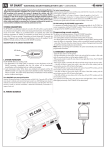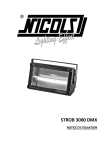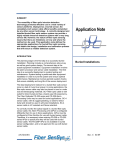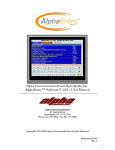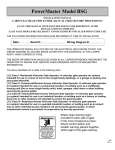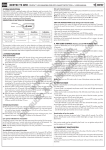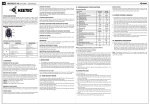Download Manual-alarma auto- Tomahawk-TW-9010
Transcript
TOMAHAWK TW-9010 ® TOMAHAWK CAR ALARMS TW-9010 Two Way Car Alarm System USER MANUAL INSTRUCTIONS FOR INSTALLATION TOMAHAWK TW-9010 CONTENTS USER MANUAL 1 2 3 4 5 6 7 8 9 10 11 12 13 14 15 16 17 18 19 20 21 22 23 24 25 26 27 28 29 30 31 32 33 34 35 System main features Remote control trinkets LCD features Arming mode Arming with siren disabled Automatic arming and re-arming Immobilizer features Disarming Opening/closing doors with engine working Two-step door opening/channel 3 Remote engine start-up Remote engine cut-off Turbo timer Warming-up engine to specified temperature Daily (1, 2, 4, 12-hour) automatic start-up Remote status scanning Remote boot opening 2nd auxiliary channel Car searching Remote shock sensor disabling Alarm modes “Panic” mode “Anti-hijack” mode “Valet” mode Call driver “Override” button functions Emergency arming/disarming Remote start-up preparation for cars with manual transmission Programming auxiliary trinkets LED indicator operation modes Trinket-pager battery replacement Programming mode Programming trinket-pager functions Programming table Description of programmable functions 1 2 3 4 5 6 Basic installation principles Choosing locations for main units Wire connections Selection of manual or automatic transmission Connection of central lock Setting shock sensor Connection diagram Engineering data 2 3 4 6 6 7 7 7 7 8 8 8 9 9 10 10 11 11 11 11 11 12 12 12 13 13 14 15 15 16 16 17 18 19 20 INSTRUCTIONS FOR INSTALLATION 23 23 25 27 28 28 29 37 1 TOMAHAWK TW-9010 USER MANUAL 1. System Main Features 5-button 2-side programmable trinket with LCD LCD backlight Vibration mode Anti-scanner Anti-grabber Programmable trinkets (up to 4 items) Visual and sound confirmation of functions performed Arming with siren disabled Secured remote engine start-up/cut-off Installation option for cars with automatic or manual transmission Installation option for cars with gasoline or diesel engines Cabin temperature control Auxiliary temperature sensor Automatic engine warm-up to specified temperature Daily (1, 2, 4, 12-hour) automatic start-up Defective area bypass with visual and sound confirmation Two-zone shock sensor Remote shock sensor disabling Protection against mis-operations Self-diagnostics 3 extra channels “Anti-hijack” mode “Panic” mode “Valet” mode Doors, hood and boot security Trinket-pager battery charge indication Trinket-pager battery power-saving mode “Driver calling” feature Car searching Clock, alarm-clock and timer built in trinket-pager System status LED indication Central lock built-in relay Status memory Two-step disarming Two-step central lock opening Engine locking Automatic pager active area control Turbo timer 2 TOMAHAWK TW-9010 2. Remote Control Trinkets 3 TOMAHAWK TW-9010 3. LCD Features Fig. 3 1. -- security mode indication. 2. – “silent security” mode indication 3. – closed central lock indication 4. -- open central lock indication 5. – open door(s) indication 6. – open hood indication 7. – open boot indication 8. - parking lights flashing indication 4 TOMAHAWK TW-9010 9. – trinket-pager transceiver operation indication 10. – indication for presence in active zone 11. – power-saving mode indication 12. – “driver call” indication 13. – warm-up to specified temperature mode indication 14. – daily auto start indication 15. - light shock indication 16. – strong shock indication 17.1 - shock sensor warning zone disabling indication 17.2 - shock sensor disable indication 18. - “Anti-Hijack” mode indication 19. - vibration mode indication 20. - “Valet” mode indication 5 TOMAHAWK TW-9010 21. - hand-brake disengage indication 22. - started engine indication 23. - battery level indication 24. - timer switch-on indication 25. - alarm-clock switch-on indication 26. 27. - clock - temperature measurement units (C or F) 4. Arming Mode To arm a car, I is necessary to press button 1 time. Parking lights will flash 1 time; siren will sound 1 “CHIRP” to confirm entry in security mode, doors and windows will close (if connected). LCD will display icons and . In case when siren sounds 3 “CHIRPS”, it means that the system detected and disabled a defective zone (open door, hood, boot or hand-brake disengaged). The system will automatically take this zone for protection as soon as the zone is repaired (door, hood, boot closed and hand-brake engaged). 5. Arming Mode with Siren Disabled To arm a car without siren sounds (all messages and confirmations will be sent by the system to the trinket-pager only), press button 1 time. Parking lights will flash 1 time to confirm entry in security mode, doors will close. LCD will display icons and . You can also switch this mode ON and OFF while in security mode. 6 TOMAHAWK TW-9010 6. Auto Arming and Re-arming If the auto arming function is enabled, then: with ignition OFF, after all doors are closed the system will alert with 1 long “CHIRP” and will switch security mode ON 10 sec later (see Programming Table). Auto re-arming function is always enabled in the case when after disarming none of the doors open within 30 sec. 7. Immobilizer Mode The immobilizer mode is enabled automatically 30 sec after ignition cut-off (see Programming Table). LED indicator glows continuously in this mode. In this mode, engine start-up with ignition key is not possible. To exit the immobilizer mode, press button 1 time or switch ignition OFF and press button OVERRIDE 1 time. 8. Disarming To disarm vehicle, press button 1 time. Parking lights will flash 2 times; siren will sound 2 “CHIRPS” (if the system is not in security mode with siren disabled) to confirm disarming, doors will open and lighting will go in (if connected). LCD will display icon . 9. Door Opening/Closing with Engine Working If the car engine was started with ignition key, then you can open and close doors with button . LCD will display icons and respectively. 7 TOMAHAWK TW-9010 10. Two-step Door Opening or Channel 3 These functions are not available at the same time! Use Programming Table to select one thereof. 1. Two- step door opening function is selected. Press button to disarm and open the driver’s door. Second press and hold of this button will open other doors. 2. Auxiliary channel function is selected. Press and hold button to enable an auxiliary (supplementary) channel. ATTENTION! These functions require additional connection while installation. 11. Turbo Timer Tomahawk TW-9010 provides a turbo function for vehicles with turbo engines. If this function is enabled, the engine keeps on running after ignition OFF for 1, 3 or 6 min (see Programming Table). 12. Remote Engine Start-up Press button . Parking lights will flash 3 times; siren will sound 3 “CHIRPS”. LCD will display the following icons: 1. – engine start-up attempt. 2. – if engine fails to start for any reason. 3. – engine started (accompanied by trinket-pager melody) The engine will run during pre-programmed time (see Programming Table), after which will stop automatically. The run time can be prolonged using buttons and by 5 min after each press, to 20 min maximum. LCD will display time before engine stop. 8 TOMAHAWK TW-9010 ATTENTION! Remote engine start-up cannot be done in the case if: 1. Gear lever is not in neutral position. 2. Ignition switched ON. 3. The hood is open. 4. The hand-brake is not engaged. In any of these occasions, siren will sound 4 “CHIRPS” at a remote start-up attempt. 13. Remote Engine Stop In the case when the engine was started using remote start-up, you can stop it by pressing button . Parking lights will flash 4 times; siren will sound 4 “CHIRPS”. LCD will hide icon a melody will play. and 14. Warming-up Engine to Specified Temperature Tomahawk provides for an auxiliary temperature sensor for installation under the hood (see Diagram No.10). If this sensor is installed, engine start and warm-up is performed by this sensor’s data, otherwise by the cabin temperature sensor data. and simultaneously. Parking lights To enable this function, press and hold buttons will flash 1 time and siren will sound 1 “CHIRP” to confirm enabling the function. LCD will display icon and the specified temperature for warm-up switch-on (programmable, see Programming Table) accompanied with a melody. When temperature reaches the specified value for automatic warm-up switch-on, the engine will start for previously programmed time (see Programming Table). 9 TOMAHAWK TW-9010 To disable this function, press buttons and . Parking lights will flash 2 times and siren will sound 2 “CHIRPS” to confirm disabling the function. LCD will hide icon melody will play. and a Note: Automatic engine warming-up to specified temperature should be made six times per two hours as maximum. Temperature for automatic engine warming-up may be set at -5°C, -10°C, -20°C, -30°C (see Programming Table). 15. Daily (1, 2, 4, 12-hour) Automatic Start-up To enable this function, press and hold buttons and simultaneously. Siren will sound 1 “CHIRP” to confirm enabling the function. LCD will display icon and a melody will play. After this function is enabled, beginning from the next day, the system will automatically start engine at the time of enabling. To disable the daily start-up function, press buttons and . Parking lights will flash 2 times and siren will sound 2 “CHIRPS” to confirm disabling the function. LCD will hide icon and a melody will play. To enable 1, 2, 4 and 12 hour start-up, it is necessary to enable the daily start function and then during 5 seconds to press the respective button on the trinket: – for hourly start, – for start-up every 2 hours, – for start-up every 4 hours, – for start-up every 12 hours. 16. Remote Status Scanning To perform remote status scanning, press button . Parking lights will flash 3 times to confirm data transfer to the trinket-pager receiver; temperature in the cabin, security status, etc. 10 TOMAHAWK TW-9010 17. Remote Boot Opening To remotely open the boot, press and hold button . Parking lights will flash 3 times to . confirm the boot opening. LCD will display icon ATTENTION! This function requires auxiliary connection while installation. 18. 2-nd Auxiliary Channel To enable this function, press and hold button sound 1 “CHIRP” to confirm enabling the function. . Parking lights will flash 1 time, siren will ATTENTION! This function requires auxiliary connection while installation. 19. Car Search To enable this function, press and hold buttons and simultaneously. Parking lights will flash 6 times and siren will sound 6 “CHIRPS” to show car location. 20. Remote Shock Sensor Cut-off To enable this function, while in security mode press and hold buttons and simultaneously. LCD will display icon to show that the shock sensor warning zone is disabled. Second press on the buttons will disable the shock sensor completely and LCD will display icon . To enable the shock sensor, press buttons and once again. 21. Alarm Modes On triggering the shock sensor warning zone (light shock), parking lights will flash 6 times, siren will sound 3 “CHIRPS”. LCD will display icon and a melody will play. 11 TOMAHAWK TW-9010 On triggering the shock sensor main zone (strong shock), the system will enable alarm mode for 25 sec. LCD will display icon and an alarm signal will sound. On triggering any other zone, the system will enable alarm mode for 30 sec. LCD will display an icon corresponding to the triggered zone (see page 3) and an alarm signal will sound. ATTENTION! To disable the alarm signal, press button secured. . This will cut the alarm mode off but the car will remain 22. “Panic” Mode To enable this function, press and hold buttons and simultaneously, engine must not be started. Parking lights will flash 3 times and siren will sound 3 “CHIRPS” to attract attention to your car. 23. “Anti-Hijack” Mode To enable this function, press and hold buttons and simultaneously. Parking lights will flash for 30 sec, then the system will enable alarm mode, engine starter will be locked. LCD will display icon and an alarm signal will sound. To disable this mode, press button . This mode can be also enabled using button “Anti-hijack”. Press button “Anti-hijack” (car engine must be started). Parking lights will blink for 30 sec, after which the system will enable alarm mode, engine starter will be locked. This mode will not be disabled before button pressed. You can also exit this mode by holding button “Anti-hijack” for 5 sec. is 24. “Valet” Mode To enable this function, press and hold buttons , and simultaneously. Parking lights will flash 4 times and siren will sound 4 “CHIRPS” to confirm Valet mode enabling. LCD will display icon , and a melody will play. 12 TOMAHAWK TW-9010 In this mode, only service functions are available, such as auxiliary channels, car search, call driver, etc. Also available are re-arming function and programming mode. To disable this function, again press , and simultaneously. Parking lights will flash 3 times and siren will sound 3 “CHIRPS” to confirm Valet mode disabling. LCD will hide icon , and a melody will play. 25. Call Driver To enable this function, press call button located on antenna-transmitter. LCD will display icon , and a melody will play. 26. “Override” Button Functions Some of TOMAHAWK TW-9010 functions can be enabled without control trinkets. To enter this mode, do the following: 1. Switch ignition OFF 2. Using “Override” button to select required function: A) “Valet” mode – 3 times B) Daily auto start – 4 times C) Auto warm-up to specified cabin temperature – 5 times 3. Switch ignition ON 4. The system will confirm the selected function with siren CHIRPS and LED flashes: A) “Valet” mode – 3 CHIRPS and flashes B) Daily auto start – 4 CHIRPS and flashes C) Auto warm-up to specified cabin temperature – 5 “CHIRPS” and flashes 5. To enable/disable the functions, press button “Override” 6. The system will confirm enabling/disabling the function with siren “CHIRPS” and LED flashes: 13 TOMAHAWK TW-9010 1 “CHIRP” and flash – function enabled 2 “CHIRPS” and flashes – function disabled 7. Switch ignition OFF. NOTE: If the daily auto start function is enabled, the engine will start up immediately after ignition is switched OFF. Use your remote control trinket to stop the engine. 27. Emergency Arming/Disarming 1. For emergency arming: A) Switch ignition ON (engine must not be started) B) Press button “Override” 8 times C) Switch ignition OFF Parking lights will flash 1 time and siren will sound 1 “CHIRP” to confirm the function enabling. 20 sec later the system will enable security mode. NOTE: If 20 sec after emergency arming any of security zones is triggered, the system will alert you with 4 parking light flashes and 4 siren “CHIRPS” providing you 20 sec to disarm the car. If disarming does not take place, the system will enable alarm mode. 2. For emergency disarming: A) Switch ignition ON (engine must not be started) B) Press button “Override” 4 times C) Switch ignition OFF Parking lights will flash 2 times and siren will sound 2 “CHIRPS” to confirm the function enabling. NOTE: Remote control trinkets remain functioning after emergency arming/disarming. 14 TOMAHAWK TW-9010 28. Remote Start-up Preparation for Cars with Manual Transmission To ensure capability of remote start-up for cars with manual transmission, the gear lever should be in neutral position. Before stopping car engine, perform the following procedures: 1. Enable car hand-brake (engine should be started) 2. Press button , LCD will display icon , and a melody will play. Perform step 3 and 4 within 30 sec 3. Remove key from ignition lock (engine should keep on running) 4. Open the door, get out the car and close the door If all the steps are performed correctly, the system will automatically stop the engine, if not – capability of remote start-up will be disabled. 29. Programming Auxiliary Trinkets TOMAHAWK TW-9010 provides for recording up to 4 remote control trinkets in its memory. To record, perform the following: 1. 2. 3. 4. Switch ignition ON (engine should not be started) Press and hold button “Override” Wait for 4 “CHIRPS” to confirm entry in the trinket programming mode Release button “Override” 5. Press and hold buttons and before you hear siren “CHIRPS”, confirming memorization of a new trinket (1 “CHIRP” for first trinket, 2 “CHIRPS” for second trinket, 3 “CHIRPS” for third trinket and 4 “CHIRPS” for fourth trinket) 15 TOMAHAWK TW-9010 6. The system will automatically exit the trinket programming mode, if it does not receive signals from the trinket within 6 sec. ATTENTION! All un-programmed trinkets will be erased from the memory. 30. LED Indicator Operation Modes The system displays its status using LED indicator when car ignition is switched OFF. System status 1. Remote start-up mode and Immobilizer mode 2. Car disarmed 3. Car armed 4. Daily auto start mode 5. Auto warm-up to specified temperature mode 6. Daily auto start mode and Auto warm-up to specified temperature mode 7. “Valet” mode Number of flashes Glowing continuously Disabled 1 flash 2 flashes 3 flashes 4 flashes 5flashes 31. Trinket-pager Battery Replacement If battery charge indicator looks like that replacement. 1. Open trinket-pager battery cover 2. Remove used battery , it means the battery is low and needs prompt 3. Press button 4. Insert new battery 5. Close trinket-pager battery cover 6. Press button Battery type: AAA. Alkaline batteries are recommended. 16 TOMAHAWK TW-9010 32. Programming Mode To enter the programming mode, perform the following: 1. Switch ignition ON (engine should not be started) 2. Press button “Override” 6 times 3. Switch ignition OFF (6 siren “CHIRPS” will confirm entry in programming mode) Use button “Override” to select required function. Each press means change to the next function. The system will indicate selected function with siren “CHIRPS”: Short “CHIRP” – 1 Long “CHIRP” – 5 EXAMPLE: 14 button “Override” presses – 2 long and 4 short “CHIRPS” – function 14 is selected See numbers and descriptions of functions in Programming Table. 17 TOMAHAWK TW-9010 33. Programming Trinket-pager Functions Buttons used Functions performed Notes Backlight switch On Disabled automatically after 5 sec Power saving mode switch ON Trinket-pager receiver switched OFF automatically 2 min after disarming Sound/Vibration mode toggle Clock, alarm-clock and timer setting mode hold Clock setting mode - hour Clock setting mode - minutes 1 time Setting hour/minute forward. Hold for fast scrolling. Alarm clock setting mode - hour 2 times Alarm clock setting mode - minutes 3 times Setting hour/minute backward. Hold for fast scrolling. Alarm clock setting mode – ON/OFF 4 times Timer setting mode - hour 5 times Timer setting mode - minutes 6 times Timer setting mode – ON/OFF 7 times Alarm clock setting mode Timer setting for 10 min 1 time Timer setting for 20 min 2 times Timer setting for 30 min 3 times Timer setting for 60 min 4 times Timer setting for 90 min 5 times Timer setting for 120 min 6 times 18 TOMAHAWK TW-9010 34. Programming Table Number of “Override” presses Confirmation Description of function 1 time 2 times 3 times 4 times 5 times 6 times 7 times 8 times 9 times 10 times 1 short “CHIRP” 2 short “CHIRPS” 3 short “CHIRPS” 4 short ‘”CHIRPS” 1 long “CHIRP” 1L+1S “CHIRPS” 1L+2S “CHIRPS” 1L+3S “CHIRPS” 1L+4S “CHIRPS” 2 long “CHIRPS” 11 times 12 times 13 times 14 times 15 times 2L+1S “CHIRPS” 2L+2S “CHIRPS” 2L+3S “CHIRPS” 2L+4S “CHIRPS” 3 long “CHIRPS” 16 times 3L+1S “CHIRPS” Time to stop engine after remote start (min) Specified engine temperature for automatic warm-up (oC) Starter operation time for remote start-up (msec) Engine operation control on order: Time for enabling 2-nd auxiliary channel (sec) Siren impulse duration (msec) Cable IGN 2 (ON/OFF) / Door closing at remote start-up Starter ON delay before gasoline/diesel engine start (sec) Duration of central lock opening/closing impulse (sec) Two-step door opening or 3rd auxiliary channel/immobilizer Safe driving function Auto arming Cabin lighting delay count (sec) Time for cabin light switch ON/window raising (sec) Temperature measurement units/type of locking (black and white cable) Turbo- timer 1 1 1 1 CHIRP 5 -5 800 Ver.1 0.8 100 Ver.1 2 Ver.1 Ver.1 CHIRPS 10 -10 1200 Ver.2 10 10 Ver.2 10 Ver.2 Ver.2 CHIRPS CHIRPS 20 -30 3000 OFF Ver.1 1 Ver.1 Ver.1 Ver.1 Ver.2 15 Ver.2 Ver.2 Ver.2 Ver.3 30 Ver.3 Ver.3 Ver.3 OFF 1 min 3 min 6 min 15 -20 1800 Ver.3 30 15 Ver.3 10 Ver.3 Ver.3 constant 20 Ver.4 10 Ver.4 Ver.4 45 Ver.4 Ver.4 NOTE: The system confirms selected functions using siren “CHIRPS”: L – long “CHIRP”, S – short “CHIRP”. Function is confirmed using the following siren “CHIRPS”: – 1 “CHIRP”, – 2 “CHIRPS”, – 3 “CHIRPS”, – 4 “CHIRPS” ATTENTION! Factory settings for programmable functions are underlined. 19 TOMAHAWK TW-9010 35. Description of Programmable Functions 1. Time allotted for engine running after remote start-up: 5/10/15/20 min. 2. Engine temperature when automatic warm-up is switched ON (if the function is enabled): -5o/ -10o/-20o/30oC. 3. Time for starter operation when remote start-up function is enabled: 800/1200/1800/3000 ms. Time for the first start-up attempt is specified. If first attempt fails, the system will increase time for each three subsequent attempt by 200 msec. ATTENTION! Set starter operation time for 3000 msec only when engine operation is controlled by tachometer. 4. Engine operation control versions: Version 1 – by vehicle network voltage. Version 2 – by oil pressure sensor. Version 3 – by tachometer. ATTENTION! If you choose 3rd version of engine operation control, it is necessary to program idle run RPM as follows: 1. Disconnect all power users on the vehicle (such as conditioner, radio and tape recorder, amplifier). 2. Switch ignition ON and press button OVERRIDE 9 times. 3. Switch ignition OFF. Siren will sound 9 “CHIRPS” and LED will give 9 flashes. Wait for the LED to glow. 4. Start engine with ignition key. 5. After engine speed reaches 500-1500 RPM and the engine is warmed enough, go to the next step. 6. Press and hold button OVERRIDE 1 time. If the procedure is successful, the system will sound 1 “CHIRP”, otherwise it will alert with 4 “CHIRPS” of the necessity to repeat the procedure. 20 TOMAHAWK TW-9010 5. Enabling impulse length for 2nd auxiliary channel: 0.8/10/30/constant. 6. Siren impulse (klaxon) duration: 100/10/15/20 msec. 7. Wire IGN 2 ON/OFF (see wiring diagram) and door auto closing at remote start-up: Version 1 – IGN 2 ON, locks do not close automatically at remote start-up; Version 2 – IGN 2 OFF, locks do not close automatically at remote start-up; Version 3 – IGN 2 ON, locks close automatically at remote start-up; Version 4 – IGN 2 OFF, locks close automatically at remote start-up. 8. Starter switch-on delay before remote engine start-up: 2 sec - for gasoline engines 10 sec – for diesel engines 9. Enabling impulse length for central lock: Version 1 – Closing impulse – 0.8 sec, opening impulse – 0.8 sec; Version 2 – Closing impulse – 3.6 sec, opening impulse – 3.6 sec; Version 3 – Closing impulse – 0.8 sec, 2 opening impulses – 0.8 sec; Version 4 – Closing impulse – 30 sec, opening impulse – 0.8 sec; 10. Choice of functions: 3rd auxiliary channel or two-step door opening/immobilizer: Version 1 – 3rd auxiliary channel, immobilizer OFF; Version 2 – Two-step door opening, immobilizer OFF; Version 3 – 3rd auxiliary channel, immobilizer ON; Version 4 – Two-step door opening, immobilizer ON. 11. Safe driving function: Version 1 – Doors do not close and are automatically open after ignition ON and OFF respectively. 21 TOMAHAWK TW-9010 Version 2 – Doors are automatically locked 10 sec after ignition ON and open immediately after ignition OFF. Version 3 – Doors are automatically locked 30 sec after ignition ON and open immediately after ignition OFF. 12. Auto arming. Version 1 –OFF; Version 2 – ON without locking doors Version 3 – ON with locking doors 13. Cabin lighting delay count. The system will secure doors after the specified period (1 sec/15 sec/30 sec/45 sec) after pressing button . 14. Time for closing windows after vehicle arming or switching cabin lighting ON after disarming. Version 1 – Switching cabin lighting ON for 20 sec after disarming Version 2 – Switching cabin lighting ON for 30 sec after disarming Version 3 – Closing windows 20 sec after arming Version 4 – Closing windows 30 sec after arming 15. Selection of cabin temperature measurement units displayed on trinket-pager: oC or oF / engine auxiliary blocking type (black and white cable). Version 1 – Measurement units oC, auxiliary blocking normally open Version 2 – Measurement units oF, auxiliary blocking normally closed Version 3 – Measurement units oC, auxiliary blocking normally closed Version 4 – Measurement units oF, auxiliary blocking normally open 16. Turbo timer function. 4444444 22 TOMAHAWK TW-9010 INSTRUCTIONS FOR INSTALLATION 1. Basic Installation Principles TOMAHAWK TW-9010 vehicle alarm system has a classic connection arrangement. First of all, before installation disable vehicle power system (disconnect “–“ battery terminal). To choose places for alarm system units, follow the principles as below: - Secrecy of installation - Absence of heat and moisture emitting sources near the units - Allow for minimal mutual interference between standard vehicle electronics and alarm units ATTENTION! Emitting antenna should be installed at a distance from alarm and vehicle control units. Try to minimize length of cables. 2. Choosing Locations for Main Units 1) An electronic unit for alarm control is installed inside the cabin (passenger compartment). To achieve maximum range, combined “RF” antenna for the cabinet should be placed at the highest point, without contact with metal parts and electric wires. 2) Siren is installed in the engine compartment, at a hard-to-reach place. If you use an independent siren, ensure access to service key slot. The siren should be installed with horn down to escape moisture entry. Wire connections should better be done inside cabin for less corrosion. 3) All strong current circuits (power supply, lights, central lock, etc.) should be protected with respectively rated safety fuses. 4) Hood and boot triggers are cut in places protected against moisture, inaccessible with hood and boot closed. Triggers should be oiled periodically to avoid jams and corrosion. 5) The shock sensor is installed in the cabin, an ideal place might be the vehicle centre, and secured to the car body metal with self-driving screws or pasted. 6) It is recommended to solder contacts in connections of ignition, starter and other circuits. 23 TOMAHAWK TW-9010 3. Wire Connections 6 PIN Remote Start-up Power Socket 1. Black and yellow wire – starter switch-on wire (+12V). This is an output signal +12V to starting relay. It is connected to ignition lock wire where +12V appears in the “Starter” key position. This signal is for engine start-up. Connect this wire to blocking relay. 2. Blue wire –An output signal +12V ACC – auxiliary equipment. It is connected to ignition lock wire where +12V appears in the “ACC” and “Ignition ON” key position. 3. Thin red wire – system power supply wire (+12V) It is connected to ignition battery “+” terminal via 10A fuse. 4. Thick red wire – remote start-up circuit power supply wire (+12V) It is connected to ignition battery “+” terminal via 40A fuse. 5. Yellow wire – IGN 1 wire, output signal +12V. It is connected to ignition lock wire where +12V appears in the “Ignition ON” key position and does not disappear in the “Starter” position. 6. Green wire - IGN 2 wire, output signal +12V. It is connected to ignition lock wire where +12V appears in the “Ignition ON” key position and disappears in the “Starter” position, if this wire is available on the vehicle where the system is installed. 24 TOMAHAWK TW-9010 6 PIN Remote Start-up Power Socket 1. Blue wire – central contact for central lock opening relay 2. Blue and grey wire – normally open contact for central lock opening relay 3. Blue and black wire – normally closed contact for central lock opening relay 4. Green wire - central contact for central lock closing relay 5. Green and grey wire – normally open contact for central lock closing relay 6. Green and back wire – normally closed contact for central lock closing relay 18 PIN Main Socket 1. Black wire – system “-“ (Ensure reliable contact) 2. Blue wire – wire for cabin light ON or window UP - 300mA when disarming / arming system (programmable) 3. Black and red wire – IGN 3 output - 300mA while remote start-up procedure, for arrangement of auxiliary ignition circuits. This wire may become necessary, if ignition lock of vehicle where the system is installed has more than two ignition circuits, or for enabling immobilizer by-pass modules. 4. Black and yellow wire – starter lock relay wire. - 300mA after arming system and/or remote start-up procedure and/or in “Anti-hijack” mode. ATTENTION! Blocking relay should only be used for blocking starter to prevent engine stop while movement. 25 TOMAHAWK TW-9010 5. Yellow and red wire – 2nd auxiliary channel wire (-300mA). 6. Grey and black wire – input for tachometer wire or oil pressure sensor. Connect to tachometer signal wire or oil pressure sensor wire (programmable). 7. Blue and red wire – “+” input for door sensor. 8. Orange and white wire - “-” input for boot sensor. 9. Violet wire - “Anti-hijack” function switch ON wire. “Anti-hijack” function is switched ON when “-“ appears on this wire. 10. Green and black wire – parking lights power supply wire. It is connected via 7.5A fuse. 11. Green and yellow wire – parking lights power supply wire. It is connected via 7.5A fuse. 12. Black and white wire – programmable auxiliary blocking (normally closed/normally open). 300mA (programmable). 13. Grey wire – siren output (1.5A) 14. Yellow and blue wire – 3rd auxiliary channel wire or two-step door opening wire (programmable). A) 3rd auxiliary channel – “-“ 300mA. B) Two-step door opening – “-“ 300mA. 15. Yellow and black wire – wire for remote boot opening. (- 300mA, 1 sec) 26 TOMAHAWK TW-9010 16. Orange and violet wire – hand brake wire. It is connected to “-“ hand-brake switch (for manual transmission) or to stop lights (for automatic transmission) (see diagrams 8,9) depending on car bundling. 17. Blue and black wire – “-“ input for door sensor. 18. Orange and grey wire - “-“ input for hood sensor. 4 PIN shock sensor socket Socket for shock sensor. 2 PIN “Override” button socket Socket for button “Override”. 2 PIN LED indicator socket Socket for LED indicator. 5 PIN combined antenna socket Socket for combined antenna. 4. Selection of Automatic or Manual Transmission Selection of automatic or manual transmission in TOMAHAWK TW-9010 is done using jumper 1 (see wiring diagram). Jumper closed – automatic transmission Jumper open – manual transmission 27 TOMAHAWK TW-9010 5. Connection of Central Lock TOMAHAWK TW-9010 has in-built power relays for central lock control. Wiring for connection of central lock is made in a separate six-pin socket. Wire colours and wiring diagrams are shown in diagrams 1-4. ATTENTION! Please note that impulse duration for central lock control is a programmable function. 6. Setting Shock Sensor Setting is the last installation stage of TOMAHAWK TW-9010 alarm system. Set shock sensor sensitivity to minimum. Gradually increase sensitivity and knock the car body with your palm to check triggering threshold. ATTENTION! Excess sensitivity may result in a great number of false trigger actions; you will be forced to desensitize sensors. 28 TOMAHAWK TW-9010 Wire Connections Fig. 4 29 TOMAHAWK TW-9010 6 PIN Remote Start-up Power Socket Diagram 1 ATTENTION! Connect blocking relay socket according to diode polarity shown in diagram 1. Ignition key position Off ACC Ignition Start Wire System power supply wire Starter wire IGN 1 wire ACC wire IGN 2 wire Power circuit supply wire IGN 3 wire 30 TOMAHAWK TW-9010 6 PIN central lock connection socket 18 PIN main socket Diagram 2 31 TOMAHAWK TW-9010 4 PIN shock sensor socket 2 PIN “Override” button socket 2 PIN LED indicator socket 5 PIN combined antenna socket Diagram 3 32 TOMAHAWK TW-9010 Connection of auxiliary electric drive Control time 0.8 sec Diagram 4 Central lock positive control Control time 0.8 sec Diagram 5 33 TOMAHAWK TW-9010 Central lock negative control Control time 0.8 sec Diagram 6 Pneumatic central lock (Audi, Mercedes) Control time 3.6 sec Diagram 7 34 TOMAHAWK TW-9010 Diagram 8 Diagram 9 35 TOMAHAWK TW-9010 Diagram 10 36 TOMAHAWK TW-9010 Engineering data Rated voltage Current consumption +12V 15mA Allowable current: 6 PIN remote start-up power socket In power supply circuit thick red wire (limited with fuse) 30A In power supply circuit thin red wire (limited with fuse) 10A IGN 1, “+” (yellow wire) 30A IGN 2, “+” (green wire) 30A IGN 3, “-” (black and red wire) 300mA Starter wire, “+” (black and yellow wire) 30A 6 PIN central lock connection socket In contact relay circuit for central lock control (limited with fuse) 20A 37 TOMAHAWK TW-9010 18 PIN main socket Blocking relay contacts 40A Blocking relay service output, “-“ (black and yellow wire) 300mA Siren power output, “+“ (grey wire) 2A Auxiliary channel 1 output, “-“ (yellow and black wire) 300mA Auxiliary channel 2 output, “-“ (yellow and red wire) 300mA Auxiliary channel 3 output, “-“ (yellow and blue wire) 300mA Size lights power supply outputs, “+“ (green-black and green-yellow wires, limited with fuses) 7.5A Output to cabin light, “-“ (blue wire) 300mA Temporary intervals: Service output, “-“ permanently armed (black and yellow wire) Auxiliary channel 1 output, “-“ (yellow and black wire) 1 sec 38 TOMAHAWK TW-9010 Auxiliary channel 2 output, “-“ (programmable) (yellow and red wire) 0.8 sec 10 sec 30 sec Permanently Auxiliary channel 3 output, “-“ (yellow and blue wire) 0.8 sec Impulse duration for central lock control (programmable) 0.8 sec 3.6 sec 30 sec This device meets weather requirements under GOST 15150 for UHL 2 version (installation inside cabin). This device meets electric compatibility requirements under GOST R50789-95. 39









































